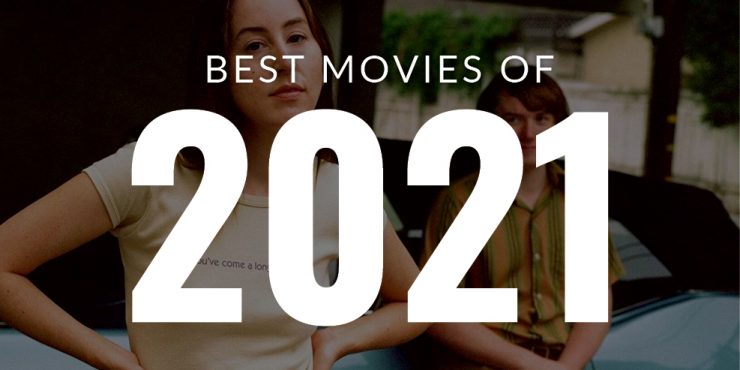It’s almost tragic that, as I put together my end of the year list for 2021, the COVID-19 pandemic would make yet another vicious comeback into our lives and force us back into the half-lives we were experiencing in 2020. This was the year that the movies came back and just like that, a new, hyper-contagious variant wipes it away before New Year’s. With the influx of vaccines, I found myself back inside the dark theaters of BAM Rose Cinema in Brooklyn, Alice Tully Hall in Lincoln Center, the Quad Cinema in the West Village. At AMC screenings, Nicole Kidman welcomed us back in a hilarious intro advertisement that was both a sincere sentiment and a camp masterpiece (name a more iconic line of the year than “Heartbreak feels good in a place like this”). Despite the events of these recent weeks, 2021 will still be the year that the movies came back for me, and I accepted them with open arms. There were new films from some of my favorite directors (Paul Thomas Anderson, Pedro Almodóvar), and some from filmmakers I newly discovered (Jasmila Zbanic, Ryusuke Hamaguchi). Biopics got spooky and weird, and westerns got foreboding and queer. And everything in between. Here is my list of the best films of the year:

1. Bergman Island
Directed by Mia Hanson-Løve
In a year noted for the return of the movies, what better film than one about two directors talking about movies – movies from the past, movies that they’re writing, movies that play in their heads? Vicky Krieps and Tim Roth are filmmakers taking a part-vacation, part-work trip to the Swedish island of Fårö, where their discussions about their future projects become thinly veiled projections about relationships, past and present. For a moment, Bergman Island actually becomes a film-within-a-film, starring two doomed lovers (Mia Wasikowska, Anders Danielsson Lie). Meta constructions and Bergman snobbishness are the cinematic foundations, but Bergman Island ends up cutting to the core of the matter: the pain we are able and willing to inflict on one another. “Movies can be terribly sad, tough, violent… but in the end they do you good,” Krieps says in the first half of the film. Amen to that. (Available On Demand)
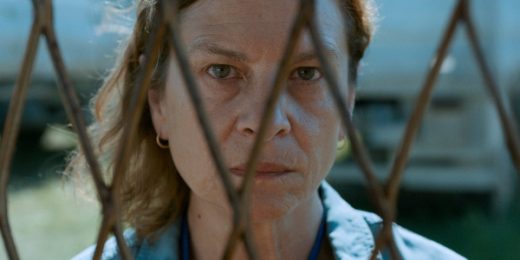
2. Quo Vadis, Aida?
Directed by Jasmila Zbanic
From the very first shot, Quo Vadis, Aida? is a fight for survival, a ticking clock against extinction. Set in Srebrenica in the midst of Mladic’s Serbian takeover, our main character, Aida (Jasna Duricic), is doing everything she can to protect her husband and sons from being slaughtered by the Serbs. Her position as a UN translator proves no help as NATO neglects to provide any military assistance and the UN troops on the ground prove impotent against Mladic’s tactics of intimidation and violence. This all spells doom, but Aida exceeds in showing its protagonist’s relentlessness, her absolute fury in trying to find a solution. As you watch, you will find yourself disgusted by the useless bureaucracy of liberal institutions and the cowardice of the world at large in the face of genocide. But you will also be astounded by Aida’s persistence. This is not an easy watch, especially if you’re someone who likes to think that the arc of the moral universe bends toward justice, but director Jasmila Zbanic will leave you spellbound with every heart-thumping second. (Available on Hulu)
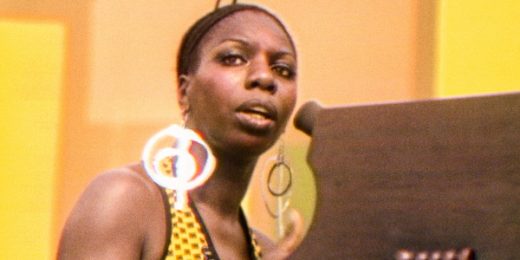
3. Summer of Soul (or, When the Revolution Could Not Be Televised)
Directed by Amir “Questlove” Thompson
When times are hard, we have our art there to protect us and make us whole. That was the working theory of the Harlem Cultural Festival, a multi-weekend music concert in 1969. For Harlem – waylaid by drug use and the civil unrest of the 1960’s – the festival was meant to be a panacea for the soul, a way to give the community something to do and something to cheer. It happened in the same Summer as Woodstock, and yet not nearly as much is known about it. That is, until Questlove reminded us, uncovering long-unseen footage. Stevie Wonder, Nina Simone, Sly and the Family Stone, and many others perform for huge crowds in Mount Morris Park. The performances are lively and skillful, filled with songs we know and love. That alone would have made a great concert film. But Questlove gives us more, providing interviews with attendees and performers, to fill in the gaps of what this festival really meant. Further proof that great art does have the power to heal. (Available on Hulu)
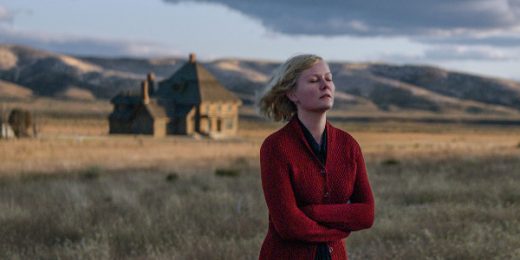
4. The Power of the Dog
Directed by Jane Campion
This ethereal, dream-like, utterly American film is a narrative told almost entirely through subtext. Benedict Cumberbatch is crude, rude, and dirty from head to toe as the rancher Phil Burbank. Phil is an old school cowboy, but he comes from a prestigious background and has an ivy league education. His behavior suggests shame about his origins, and as the film unfolds further, shame about other parts of himself that he dare not speak into existence. This is Jane Campion’s first film in thirteen years, and it’s incredibly potent. With cinematographer Ari Wegner, she crafts the year’s most beautiful shots, and with Jonny Greenwood’s score, the most unnerving emotional experience. Kirsten Dunst plays a fragile woman who marries Phil’s brother (Jesse Plemons). Her emotional fragility clashes with Phil’s cruelty, but when her son (a striking, surprising Kodi Smit-McPhee) arrives as well, the rivalry really kicks into high gear. Initially pensive, Power of the Dog becomes something like a thriller, its story rumbling toward a shocking conclusion. (Available on Netflix)
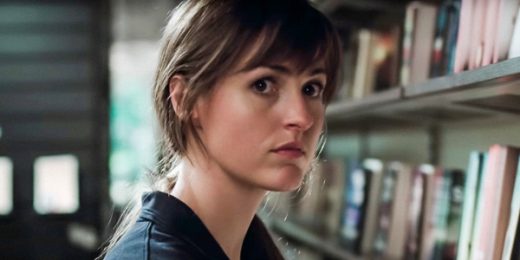
5. The Worst Person in the World
Directed by Joachim Trier
The title of this movie might be more appropriate for other 2021 protagonists (Red Rocket comes to mind), but it’s that disparity between the moniker and the character herself that makes this film so special. Renate Reinsve gives the performance of the year as Julie, a flighty woman who pursues several majors at college only to find herself working at a bookstore (painfully relevant to me, btw). She falls for a semi-famous comic book artist (Anders Danielsson Lie) before leaving him for an equally aimless barista (Herbert Nordrum). Joachim Trier, a brilliant director with a penchant for telling stories about troublesome creative lives, delivers his best film to date, one that perfectly encapsulates the dichotomy of youth (so much time, energy, and promise, but what to do with it?). A great soundtrack tempers this tonally pliant but narratively taut story, which fluctuates brilliantly between comedy and drama, irony and sincerity. It’s the first film to capture the purgatory of millennial adulthood, with Reinsve perfectly displaying that tension between morality and self-interest. (In Theaters Feb. 4)
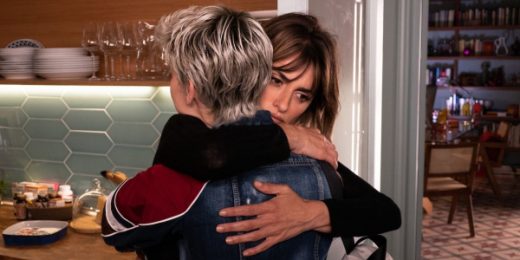
6. Parallel Mothers
Directed by Pedro Almodóvar
Penelope Cruz and Milena Smit are two single mothers who share a room in the maternity ward. After they both take their daughters home, drama arises when the maternity is questioned. This switched-at-birth drama goes in several directions you wouldn’t expect, and writer-director Pedro Almodóvar solidifies his reputation as a master of melodrama and sensuality. Cruz’s Janis is one of the best creations of the veteran actress’ career, a woman obsessed with uncovering historical truths who finds it harder to accept the frank realities of her own life. Mothers has all the usual Almodóvar touches: rich use of color, a lush musical score (from Alberto Inglesias), and a strong dose of sexuality; but in this later era of his career, he’s stepped away from provocation and controversy, and leaned into being a softer, more tender storyteller. The result is an exciting if somber film, that parallels (no pun intended) the micro of personal relationships with the macro of a nation’s fraught history. (In Theaters)
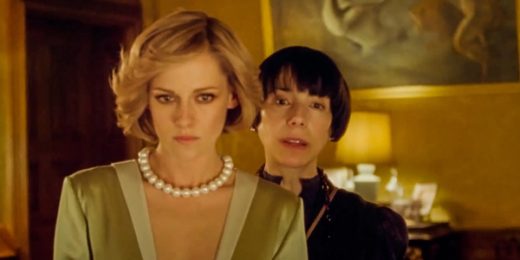
7. Spencer
Directed by Pablo Larraín
“Enough Princess Diana content!” This is a sentiment I’ll confess to feeling before I saw Spencer, Pablo Larraín’s fever dream biopic which is admittedly not stressing historical accuracy. Kristen Stewart overcomes looking nothing like Lady Di, and gives the greatest movie star turn of the year, a performance so attune to the attention of its audience, it’s impossible to keep your eyes off the screen. Larraín already did a historical-woman-in-distress drama with 2016’s Jackie. Spencer is less opaque, more in step with its lead actress and more effective in its bid to humanize a larger-than-life figure. With cinematographer Claire Mathon, Larraín creates a dazzling visual feast, equal parts magisterial and ghostly. Jonny Greenwood (once again) produces an idiosyncratic score that shifts tone and genre much like the film itself. A triumph on every level of filmmaking, Spencer is still at its heart a star vehicle, and Stewart delivers with every ounce of her stardom. (In Theaters and On Demand)
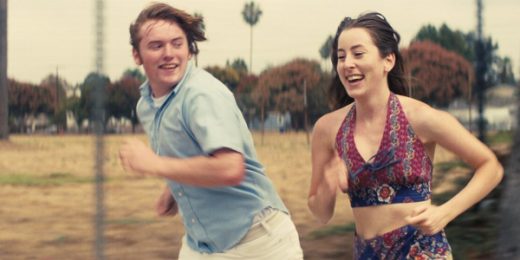
8. Licorice Pizza
Directed by Paul Thomas Anderson
There are plenty of movies about a young boy who develops a crush on an older woman. I’m not sure I’ve ever seen a film that then follows the older woman and develops her well beyond the young boy’s idealized version of her, instead diving deep into her hangups and insecurities. Alana Haim plays Alana Kane, a combative but vulnerable young woman struggling to find her place in the world at 25. She catches the eye of Gary Valentine (Cooper Hoffman), a cocksure high schooler with semi-major acting credits on his resume. His confidence against her uncertainty is the central dynamic of Licorice Pizza, which jumps episodically from moment to moment, as their close but chaste relationship evolves through various personal dramas and historical touchstones. Set in the Valley during the 1970s, Pizza is being touted as the most personal film yet from Paul Thomas Anderson, my favorite filmmaker. Anderson, a storyteller obsessed with schemers and their ultimate destruction, shows a softer side here, giving his characters more buoyant happiness than he ever has before. (In Theaters)
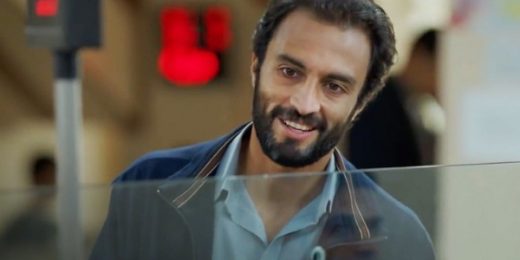
9. A Hero
Directed by Asghar Farhadi
Farhadi already has two Oscars so his reputation certainly precedes itself. His moral tales are always tight, complex narratives where the protagonist is trapped in dilemmas of his own making. A Hero is, in part, about social media, and the fervor to take inspirational stories and expose the cynical details behind them. Amir Jadidi is Rahim a convict in Tehran hoping to make peace with a debt collector and get his prison time eliminated through a shaky scheme. When he instead decides to do a good deed, at the expense of his plan, he becomes a local news story and a symbol of rehabilitation. Knowing Farhadi, it’s obvious that things won’t be that simple. Moods shift, resentments grow, and Rahim’s good fortune quickly sours. Farhadi has a Hitchcockian gift for suspense, but he accomplishes it without thriller plot points. He instead weaves with tales of working class people. His dramas reflect the decisions that we make on a day-to-day business, and though his films ofter take place in his native Iran, their humanist message can reach any audience around the world. (Available on Prime Video on Jan. 21)
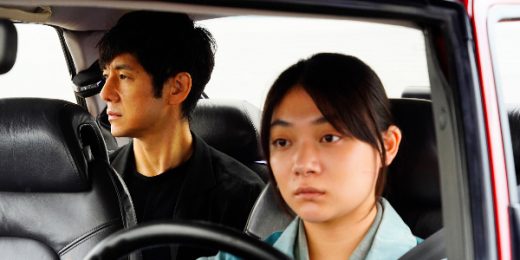
10. Drive My Car
Directed by Ryusuke Hamaguchi
A man has an important relationship with his vehicle. In the case of Yüsuke (Hidetoshi Niishijima), it’s true tenfold. His car is a safe space and also a system he uses to perform his work. An actor, he learns his lines from tape recordings that his wife makes. When that wife dies, the ritual takes on an even more intense significance. When Yüsuke takes a job directing Uncle Vanya in Hiroshima, a non-negotiable stipulation is that he must have a driver. It ends up being a young woman (Toko Miura) who also has a troubled past and a stern demeanor. The relationship that grows between the two is methodical and practical, but also cathartic. Drive My Car is a fascinating film about communication. The production contain actors from different countries speaking their native tongue, and Yüsuke creates a harmony between the performers that transcends the understanding of language (Park Yoo-rim performs her part in Korean Sign Language). That the characters in this film harmonize better speaking different languages on stage than they do speaking the same language to each other is an intentional irony, and one that makes Drive My Car such a brilliant film to behold. (In Theaters)
Tied for Eleventh Place (Honorable Mention): Joanna Hogg’s The Souvenir Part II (the sequel to her 2019 film) is a masterful portrait of the artist as a young woman, a brilliant venture into the metaverse of Julie, brought to life by an incredible performance from Honor Swinton Byrne; The Mitchells vs. The Machines was the funniest movie of 2021; Janicza Bravo took a viral tweet thread and made Zola, a hilarious, spiraling true story about the darker side of sex work; in No Sudden Move, Steven Soderbergh got an all-star ensemble and a bunch of weird lenses and made one of the best noirs in years; Joaquin Phoenix gives one of his best performances in Mike Mills’ treacly but effective C’Mon C’Mon; Bo Burnham: Inside was a take on comedy specials that felt something like depression and managed that dichotomy wondrously; Maggie Gyllenhaal mined the brilliance of author Elena Ferrante (and her lead actress, Olivia Colman) in her adaptation of The Lost Daughter; Titane was the most unhinged batshit film of the year, the most singular (and exhilarating) experience I’ve had in a movie theater maybe ever; in Tina: The Documentary, Tina Turner’s well-covered life story gets another treatment, but this time it’s on her terms; David Lowery finds the stunning beauty within the Medieval epic The Green Knight; the politics of the world’s stage is boiled down to a single teacher’s sex tape in Bad Luck Banging or Looney Porn, a satire that occasionally reads like a warning of what’s to come.










